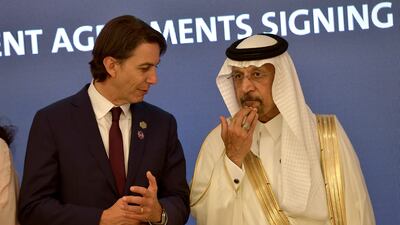Saudi Arabia and the US signed 13 investment agreements on the sidelines of US President Joe Biden’s visit to the kingdom on Friday, as the Arab world's biggest economy seeks to attract more foreign direct investment for diversification.
The agreements cover sectors including energy, aerospace, defence, textiles, manufacturing, education and tourism, according to a statement from the Ministry of Investment of Saudi Arabia on Saturday.
“The agreements build upon a long-standing economic relationship and illustrate sustained US investor confidence in opportunities in the kingdom,” the ministry said.
In October last year, Saudi Arabia’s Crown Prince Mohammed bin Salman launched the National Investment Strategy, which seeks to net 388 billion riyals ($103.47bn) in foreign direct investments annually according to state-run Saudi News Agency.
The kingdom also expects to increase its domestic investment to about 1.7 trillion riyals by 2030 under the new strategy.
Saudi Arabia, Opec’s top oil exporter, is focused on diversifying the economy under its Vision 2030 programme, which aims to cut its dependence on hydrocarbons and develop local industries and manufacturing capabilities.
The National Investment Strategy, which is one of the main pillars of Vision 2030, is expected to contribute to the growth of the local economy.
Under the strategy, Saudi Arabia aims to increase the contribution of the private sector to its gross domestic product to 65 per cent and increase FDI’s share to 5.7 per cent of its GDP.
The strategy also aims to increase the proportion of non-oil exports from 16 per cent to 50 per cent, reduce the unemployment rate to 7 per cent and advance the kingdom to one of the top 10 positions in the Global Competitiveness Index by 2030.
US investment in Saudi Arabia has continued to grow over recent years, with 743 companies present in the kingdom and nearly 70,000 Saudis employed by US companies, the Ministry of Investment said.
The US and Saudi Arabia signed four memorandums of understanding concerning health care, according to the statement.
Other agreements include a partnership between the Ministry of Investment and aerospace company Boeing in areas relating to aircraft manufacturing, and an agreement between investment holding company Ajlan & Bros and US smart energy firm SolarEdge to explore investment in renewable energy.
The US entered into an agreement with the Royal Commission for Jubail and Yanbu, while private sector companies, such as Raytheon Defence Industries, Medtronic, Digital Diagnostics and IQVIA, also signed investment deals with firms in Saudi Arabia, according to state news agency SPA.
US President Joe Biden visits Middle East - in pictures
US companies across energy, tourism, education, manufacturing and textiles sectors also joined hands with Saudi-based businesses to boost investment, SPA said.
Saudi Arabia’s Ministry of Communications and Information Technology (MCIT) signed a memorandum of co-operation with tech company IBM to train 100,000 young women and men over five years to position the kingdom as a centre for technology and innovation in the Middle East and North Africa region.
MCIT also signed a memorandum of co-operation with the US National Communications and Information Administration which involves 5G and 6G technologies.
The agreement aims to speed up the growth of the digital economy and the pace of research, development and innovation in the kingdom’s digital industries, according to the news agency.
The International Monetary Fund estimates that the Saudi economy will expand by 7.4 per cent this year, driven by higher oil revenue, a projected improvement in the country's non-oil gross domestic product and its efforts to diversify the economy.
The World Bank estimates that the country's economy will grow 7 per cent this year, while Jadwa Investment expects the economy to expand 7.7 per cent in 2022.































































